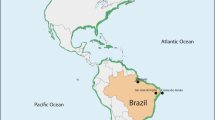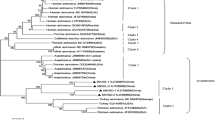Abstract
The discovery and analysis of pathogens carried by non-human primates are important for understanding zoonotic infections in humans. We identified a highly divergent astrovirus (AstV) from fecal matter from a rhesus monkey in China, which has been tentatively named “monkey-feces-associated AstV” (MkAstV). The full-length genome of MkAstV was determined to be 7377 nt in length. It exhibits the standard genomic AstV organization of three open reading frames (ORFs) and is most closely related to duck AstV (28%, 49%, and 35% amino acid sequence identity in ORF1a, ORF1b, and ORF2, respectively). Coincidentally, while this report was being prepared, an astrovirus sequence from Hainan black-spectacled toad became available in the GenBank database, showing 95%, 94% and 92% aa sequence identity in ORF1a, ORF1b and ORF2, respectively, to the corresponding ORFs of MkAstV. Phylogenetic analysis of ORF1a, ORF1b, and ORF2 indicated that MkAstV and the amphibian-related astroviruses formed an independent cluster in the genus Avastrovirus. The host of MkAstV remains unknown. Epidemiological and serological studies of this novel virus should be undertaken in primates, including humans.

Similar content being viewed by others
References
Bailey AL, Lauck M, Sibley SD, Friedrich TC, Kuhn JH, Freimer NB, Jasinska AJ, Phillips-Conroy JE, Jolly CJ, Marx PA, Apetrei C, Rogers J, Goldberg TL, O’Connor DH (2015) Zoonotic potential of simian arteriviruses. J Virol 90:630–635
Bosch A, Pinto RM, Guix S (2014) Human astroviruses. Clin Microbiol Rev 27:1048–1074
Finkbeiner SR, Allred AF, Tarr PI, Klein EJ, Kirkwood CD, Wang D (2008) Metagenomic analysis of human diarrhea: viral detection and discovery. PLoS Pathog 4:e1000011
Jonassen CM, Jonassen TO, Grinde B (1998) A common RNA motif in the 3’ end of the genomes of astroviruses, avian infectious bronchitis virus and an equine rhinovirus. J Gen Virol 79(Pt 4):715–718
Karlsson EA, Small CT, Freiden P, Feeroz MM, Matsen FA, San S, Hasan MK, Wang D, Jones-Engel L, Schultz-Cherry S (2015) Non-human primates harbor diverse mammalian and avian astroviruses including those associated with human infections. PLoS Pathog 11:e1005225
Meliopoulos VA, Kayali G, Burnham A, Oshansky CM, Thomas PG, Gray GC, Beck MA, Schultz-Cherry S (2014) Detection of antibodies against Turkey astrovirus in humans. PLoS One 9:e96934
Mitchell DK, Matson DO, Cubitt WD, Jackson LJ, Willcocks MM, Pickering LK, Carter MJ (1999) Prevalence of antibodies to astrovirus types 1 and 3 in children and adolescents in Norfolk, Virginia. Pediatr Infect Dis J 18:249–254
Shi M, Lin XD, Chen X, Tian JH, Chen LJ, Li K, Wang W, Eden JS, Shen JJ, Liu L, Holmes EC, Zhang YZ (2018) The evolutionary history of vertebrate RNA viruses. Nature 556:197–202
Vu DL, Cordey S, Brito F, Kaiser L (2016) Novel human astroviruses: novel human diseases? J Clin Virol 82:56–63
Funding
This project was supported by the National Natural Science Foundation of China (Grant no. 81702007), and the Natural Science Foundation of China (grant no. 81290345).
Author information
Authors and Affiliations
Corresponding authors
Ethics declarations
Conflict of interest
There is no conflict of interest.
Additional information
Handling Editor: William G Dundon.
Publisher's Note
Springer Nature remains neutral with regard to jurisdictional claims in published maps and institutional affiliations.
Electronic supplementary material
Below is the link to the electronic supplementary material.
Rights and permissions
About this article
Cite this article
Xin, Yy., Li, Ll., Ao, Yy. et al. A novel astrovirus identified in wild rhesus monkey feces in China. Arch Virol 164, 2385–2388 (2019). https://doi.org/10.1007/s00705-019-04319-5
Received:
Accepted:
Published:
Issue Date:
DOI: https://doi.org/10.1007/s00705-019-04319-5




